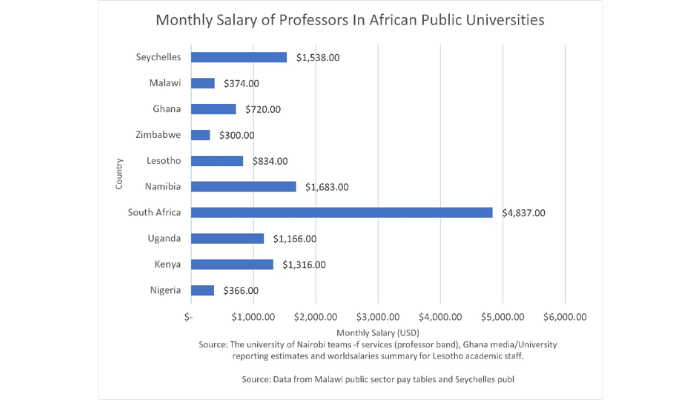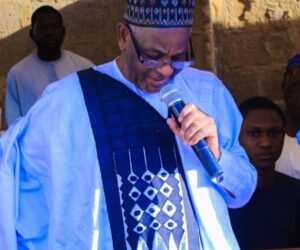…Poor remuneration drive Nigeria’s best minds out of universities – ASUU
…Nigerian professors earn 13 times less than S/African counterparts
A comparative analysis of academic salaries across Africa has revealed that Nigerian university professors are among the lowest earners on the continent, taking home less than $400 (N550,000) monthly, about 13 times lower than what their South African counterparts earn.
The disparity, which education experts say is fuelling a massive brain drain in Nigeria’s tertiary institutions, highlights the deepening crisis in the nation’s university system, where poor remuneration, worsening economic conditions, and inadequate research funding have combined to erode morale and productivity among lecturers.
Despite holding some of the most advanced qualifications and responsibilities in the country, Nigerian academics say their pay no longer reflects the value of their work, especially when compared to peers across Africa.
Read also: FG releases ₦2.3bn to address ASUU salary, promotion arrears
The Academic Staff Union of Universities (ASUU) has also raised the alarm over the worsening conditions of service for Nigerian academics, warning that the poor remuneration of university lecturers is accelerating the rate of brain drain and eroding the quality of higher education in the country.
Recent data comparing academic salaries across African countries show that Nigeria ranks among the lowest on the continent, with professors earning an average of just $366.66 (N550,000) monthly, according to ASUU salary summaries and media reports, a figure that pales in comparison to their counterparts in South Africa, who take home about $4,800, and Uganda, where professors earn around $1,166 monthly.
According to the analysis, Nigerian professors also earn 13 times less than their South African peers, while those in Kenya ($1,316), Ghana ($720.72) and Lesotho ($834) take home significantly higher pay, according to the University of Nairobi terms-of-service (professor band), Ghana media / university reporting estimates and World Salaries summary for Lesotho academic staff.
Even lecturers in smaller economies such as Malawi ($374), Seychelles (US$1,538.46) and Zimbabwe ($300) earn more than many of their Nigerian colleagues.
The study also revealed that while a South African professor earns an annual average of $58,044, a Nigerian professor earns barely $4,400, underscoring a deep gulf in academic compensation across the continent.
However, while analysts say the devaluation of the naira has contributed to worsen the Nigerian professor’s plight.
Olujimi Dada, chairperson of ASUU at the Ladoke Akintola University of Technology (LAUTECH), described the situation as unsustainable and demoralising, lamenting that Nigerian lecturers now find themselves among the poorest paid in Africa.
“The remuneration of academic work is not an individual matter; it’s a public document. Even without asking anyone, you can go online and compare what Nigerian lecturers earn with their peers elsewhere in Africa, not to mention in advanced countries. Our government is not doing the right thing. It expects better output from us, but what about the input?” Dada said
He recalled that Nigeria once attracted academics from around the world due to competitive remuneration and world-class facilities but has now become unattractive to both local and foreign scholars.
“There was a time when our universities were filled with expatriates from different parts of the world. That can no longer be said now. Today, a Nigerian professor earns less than $500, while others earn in excess of $2,000. How do you define that?” he asked.
Dada also criticised government policies that, according to him, contradict domestic realities.
“Let me shock you, the same Nigerian government that pays its professors less than $500 sends Nigerians to work in other African countries, spending around $2,000 on them monthly. How can you justify that? Do you think people will leave their comfort zones in Rwanda or Lesotho to come and teach in Nigeria? Nobody will come,” he stated.
Read also: ASUU again? No; it is the government
He warned that unless the government takes an urgent action, Nigeria’s tertiary institutions risk returning to the post-independence era when most of their teaching staff were foreigners.
“We are already at the stage where our universities are losing experts. If you look at our departments today, many no longer have specialists. In the medical field, we hardly have people left. Everyone is leaving because they can’t survive on what they earn here,” Dada said.
He noted that only fewer graduates are returning to academia, citing the unattractive pay and poor working conditions as major deterrents.
“If our students can see that there’s no hope in our career, what do you expect them to do? They won’t come back. And when that happens is that you have average people doing the work of experts, and the quality of our graduates will continue to drop.
“We have made too many sacrifices already. The question now is whether the federal government will seize this opportunity to fix the system, or allow our universities to collapse completely,” he added.
Experts have repeatedly warned that the sustained neglect of the education sector will deepen the brain drain crisis, with long-term consequences for national development.
At the national level, Chris Piwuna, ASUU president, also reiterated the union’s demands for a comprehensive review of the 2009 ASUU-FGN Agreement, sustainable funding of public universities, payment of outstanding salary arrears and third-party deductions, and revitalisation of the tertiary education system.
Piwuna noted that although the union has temporarily suspended its two-week warning strike, it would not hesitate to resume industrial action should the government fail to address the lingering issues within the one-month window agreed upon.
He noted that ASUU had temporarily suspended its two-week warning strike following a marathon National Executive Council (NEC) meeting in Abuja but warned that the union could resume the strike if progress was not made within the agreed timeframe.
Echoing his concerns, a professor from Oyo State, who preferred not to be named, described the current remuneration of lecturers as depressing and said the worsening economy has further eroded the dignity of academic work.
“Imagine a situation where someone at the peak of their career- a professor – is not earning up to £500. What you earn is a major motivator, and if that’s poor, it affects your mental health, your welfare, and ultimately your output,” he explained.
He noted that the high cost of living, inflation, and lack of welfare support have made it nearly impossible for lecturers to live decently, let alone conduct research.
Read also: ASUU: The vilified people’s tribune
“A professor is expected to fund part of their research from personal income, but when you can’t even feed your family, how do you fund research? Many lecturers can’t afford basic things. Imagine a professor unable to buy a fairly used 2006 Toyota Corolla worth about N10 million. It would take five years of savings to afford that. What do you expect of junior lecturers?”
He added that the poor state of pay is not just an individual problem but one that threatens the intellectual future of the country.
“We train the nation’s professionals – doctors, politicians, academics – yet those we train now earn far more than us. It’s disheartening. The system must be regulated to reflect fairness and sustainability,” he stressed.









